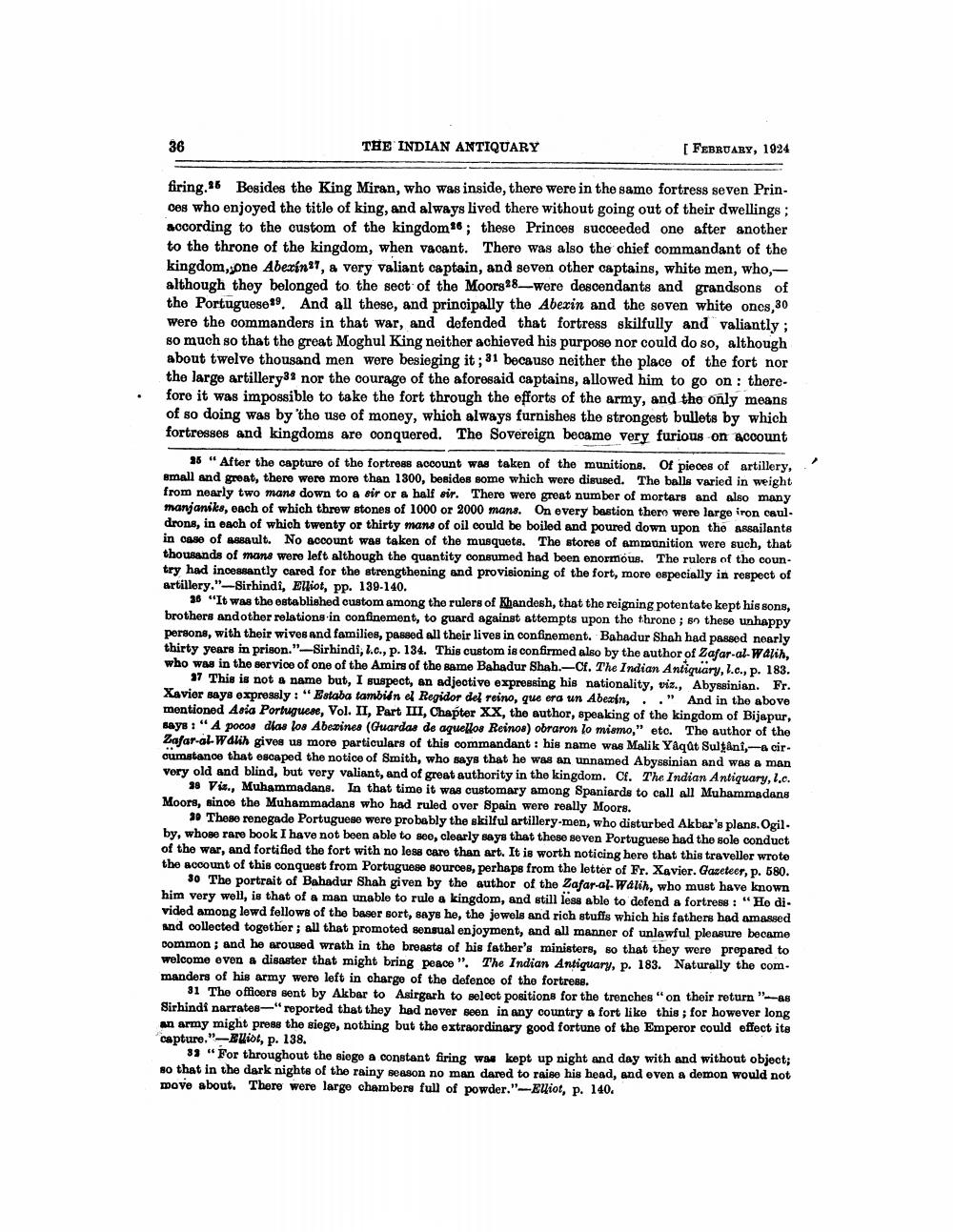________________
36
THE INDIAN ANTIQUARY
FEBRUARY, 1924
firing. 26 Besides the King Miran, who was inside, there were in the same fortress seven Princes who enjoyed the title of king, and always lived there without going out of their dwellings; according to the custom of the kingdom 16; these Princes succeeded one after another to the throne of the kingdom, when vacant. There was also the chief commandant of the kingdom, one Abexin87, a very valiant captain, and seven other captains, white men, who,although they belonged to the seat of the Moors28_were descendants and grandsons of the Portuguese9. And all these, and principally the Abexin and the seven white ones,30 were the commanders in that war, and defended that fortress skilfully and valiantly; so much so that the great Moghul King neither achieved his purpose nor could do so, although about twelve thousand men were besieging it ; 31 becauso neither the place of the fort nor the large artillery3: nor the courage of the aforesaid captains, allowed him to go on : therefore it was impossible to take the fort through the efforts of the army, and the only means of so doing was by 'the use of money, which always furnishes the strongest bullets by which fortresses and kingdoms are conquered. The Sovereign became very furious on account
36 "After the capture of the fortress account was taken of the munitions. Of pieces of artillery, small and great, there were more than 1300, besides some which were disused. The balls varied in weight from nearly two mans down to a sir or a half sir. There were great number of mortars and also many manjaniks, each of which throw stones of 1000 or 2000 mans. On every bastion thero were large iron caul. drons, in each of which twenty or thirty mans of oil could be boiled and poured down upon the assailante in case of assault. No account was taken of the musquete. The stores of ammunition were such, that thousands of mans were left although the quantity consumed had been enormous. The rulers of the country had incessantly cared for the strengthening and provisioning of the fort, more especially in respect of artillery."-Sirhindi, Elliot, pp. 139-140.
36 "It was the established custom among the rulers of Khandesh, that the reigning potentate kept his sons, brothers andothor relations in confinement, to guard against attempts upon the throne ; on these unhappy persons, with their wives and families, passed all their lives in confinement. Bahadur Shah had passed nearly thirty years in prison."-Sirhindi, 1.c., p. 134. This custom is confirmed also by the author of Zafar-al-Walih, who was in the service of one of the Amirs of the same Bahadur Shah.-C. The Indian Antiquary, 1.c., p. 183.
37 This is not a name but, I suspect, an adjective expressing his nationality, viz., Abyssinian. Fr. Xavior says expressly : "Estaba también el Regidor del reino, que era un Abegin,.." And in the above mentioned Asia Portuguese, Vol. II, Part III, Chapter XX, the author, speaking of the kingdom of Bijapur, says: "A pocos dias los Abesinca (Guardas de aquellos Reinos) obraron lo mismo," etc. The author of the Zafar-al-Walih gives us more particulars of this commandant: his name was Malik Yaqut Sulţâni,-a cir. cumstance that escaped the notice of Smith, who says that he was an unnamed Abyssinian and was a man very old and blind, but very valiant, and of great authority in the kingdom. Cf. The Indian Antiquary, 1.c.
39 Vit., Muhammadans. In that time it was customary among Spaniards to call all Muhammadang Moors, since the Muhammadans who had ruled over Spain were really Moors.
30 These renegade Portuguese were probably the skilful artillery-men, who disturbed Akber's plans. Ogil. by, whose rare book I have not been able to see, clearly says that these seven Portuguese had the sole conduct of the war, and fortified the fort with no less care than art. It is worth noticing here that this traveller wrote the account of this conquest from Portuguese sources, perhaps from the letter of Fr. Xavier. Gazeteer, p. 580.
30 The portrait of Bahadur Shah given by the author of the Zafar al-Walih, who must have known him very well, is that of a man unable to rule a kingdom, and still less able to defend a fortress : “He di. vided among lowd fellows of the baser sort, says he, the jewels and rich stuffs which his fathers had amassed and collected together; all that promoted sensual enjoyment, and all manner of unlawful pleasure became common; and he aroused wrath in the breasts of his father's ministers, so that they were prepared to welcome even a disaster that might bring peace". The Indian Antiquary, p. 183. Naturally the com. manders of his army were left in charge of the defence of the fortrese.
31 The officers sent by Akbar to Asirgarh to select positions for the trenches "on their return-66 Sirhindi narrates- reported that they had never seen in any country a fort like this ; for however long an army might press the siege, nothing but the extraordinary good fortune of the Emperor could effect ite capture."-Elliot, p. 138.
33 "For throughout the siege a constant firing was kept up night and day with and without object; so that in the dark nights of the rainy season no man dared to raise his head, and even a demon would not move about. There were large chambers full of powder."-Eliot, p. 140.




